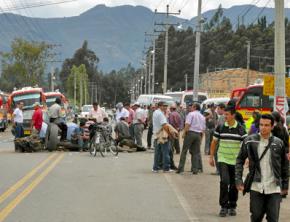Colombia’s growing labor struggle
looks at the issues at stake as Colombian workers prepare for action.
THREE OF Colombia's most powerful unions will take action on Monday and Tuesday, August 19 and 20, as the spreading anger against the Colombian government reaches a new stage.
Unions for coffee growers, truck drivers and miners are planning to participate in walkouts, protests and other actions that are set to begin on August 19, with other important organizations and forces from Colombian society also participating in this display of discontent across Colombia.
There is widespread bitterness with the Colombian government as a product of the deteriorating economic situation, the poor state of the country's health care system, and the government's push for free trade deals, such as the one recently negotiated with South Korea. This anger, combined with an uprising for autonomy in Catatumbo, along the country's eastern border with Venezuela, has united different fragmented struggles into an organized resistance against President Juan Manuel Santos, who is in the last year of his first term.

All of this is occurring against the backdrop of an ongoing peace negotiations with the Revolutionary Armed Forces of Colombia, known as the FARC. With the Colombian government losing public support, Santos will have a hard time laying the groundwork for his re-election in the coming year.
As SocialistWorker.org has reported previously (here, here and here), strikes and struggles that began with Colombian miners (both large-scale and small-scale), truck drivers (the Truckers Association of Colombia, known by its acronym ACC) and coffee growers (FEDECAFE) have spread to other sectors of the Colombian agricultural industry (rice growers, dairy workers and bakery workers, to name a few), the health care industry and teachers. The Colombian student movement, led by the Broad National Council of Students, or MANE, is pledging to support the mobilization.
As happened during the coffee growers and truck drivers' strikes earlier this year, when many roads were blockaded by workers and farmers, the agricultural unions are pledging to take to the roads as well. Plus, truck drivers are promising to protest on major routes. This means transportation will be at a standstill in many sections of the country, and important agro-industrial centers will be cut off from shipping goods and making profits--hopefully putting more pressure on the government to engage in talks with leaders of the national strike call.
AND WHAT has been the response of the Colombian government? Until recently, Santos was silent on the national strike call, leaving it to his Vice President Angelino Garzón comment on the matter.
As the day of the strike call approached, however, Santos has boldly attacked the planned days of protest, threatening legal action against public-sector workers nd mobilizing state security forces. According to Santos, the National Police will deploy 16,000 extra units around the country to "maintain order."
Besides these threats, Santos has reiterated the claim typically made by Colombian rulers that social protests are being infiltrated and incited by guerrilla groups as a way to pressure the government during its peace negotiations with the FARC. The president says he will refuse to engage in talks with leaders of the emerging struggles or reopen negotiations that have since broken down with unions that pledged to participate in the strike call.
No one knows if Santos' threats will have the effect of reducing the mobilization for the days of protest. Meanwhile, right-wing paramilitaries in the north of the country have been distributing pamphlets in which they threaten to kill anybody who supports the strike.
The deteriorating economic situation for the majority of the Colombian population and the incompetence of Santos's government is pushing onto the political stage a third force with the capacity to break into a political discourse that has historically been confined to the government and armed rebel groups. That Santos is issuing such harsh threats and promising a show of force shows that the elite will do whatever it can to keep the discussion contained to the government vs. the guerrillas. Until social movements independent of these forces can exert enough pressure, the Colombian working population will continue to be disregarded.
The August 19 national strike could be a major step forward in the development of a third social force in Colombian society--the organized working class. How far it is successful in challenging the status quo depends on whether this growing force can continue its resistance. While some unions and organizations have promised 48 hours of mobilizations, others have not said when their mobilization will end.


